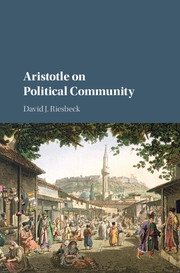Book contents
- Aristotle on Political Community
- Aristotle on Political Community
- Copyright page
- Dedication
- Contents
- Book part
- Glossary
- Introduction: Community and Exclusion
- Chapter 1 Paradoxes of Monarchy
- Chapter 2 Community, Friendship, and Justice
- Chapter 3 From the Household to the City
- Chapter 4 Rule and Justice in the Household and the City
- Chapter 5 Citizenship, Constitutions, and Political Justice
- Chapter 6 Kingship as Political Rule and Political Community
- Conclusion: Ruling and Being Ruled
- References
- Index
- Index Locorum
- References
References
Published online by Cambridge University Press: 05 August 2016
- Aristotle on Political Community
- Aristotle on Political Community
- Copyright page
- Dedication
- Contents
- Book part
- Glossary
- Introduction: Community and Exclusion
- Chapter 1 Paradoxes of Monarchy
- Chapter 2 Community, Friendship, and Justice
- Chapter 3 From the Household to the City
- Chapter 4 Rule and Justice in the Household and the City
- Chapter 5 Citizenship, Constitutions, and Political Justice
- Chapter 6 Kingship as Political Rule and Political Community
- Conclusion: Ruling and Being Ruled
- References
- Index
- Index Locorum
- References
- Type
- Chapter
- Information
- Aristotle on Political Community , pp. 291 - 304Publisher: Cambridge University PressPrint publication year: 2016



